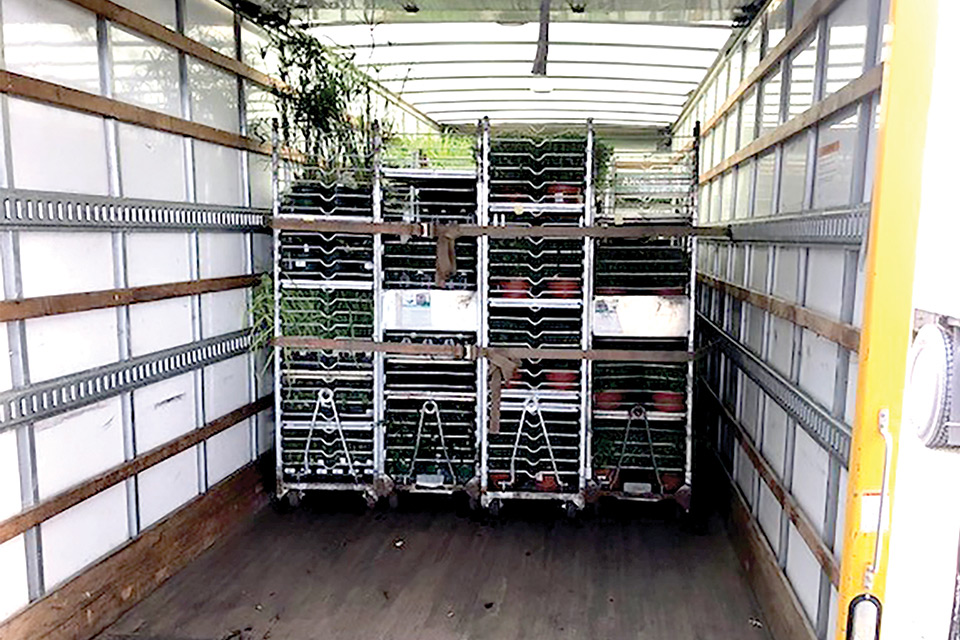Shipping Update: Greenhouse Growers Face Driver Shortages, Stringent Trucking Rules

Multiflora Greenhouses has had to hire additional drivers for loading and driving trucks.
Transportation issues rank highly among Greenhouse Grower’s Top 100 Grower community. Earlier this year, when asked about which topics they were most concerned about regarding their businesses, more than 70% of respondents listed transportation (cost, availability, and regulations) as a critical issue. This was only topped by the expected concerns about labor costs and availability.
It’s not just larger operations that face this problem. Other surveys from Greenhouse Grower indicate that whether you specialize in young plants or are a smaller grower who relies on local deliveries, you are not immune to higher shipping costs or driver shortages.
Growers Offset Fewer Drivers With More Advance Planning
At Pacific Plug & Liner (PP&L) in Watsonville, CA, a shortage of qualified drivers is the biggest short- and long-term issue, and its freight brokers agree.
“The new federal regulations that went into effect April 1 are aimed at how time is charged against drivers’ in-service hours,” says Marlon Carrera, General Manager of PP&L, who also notes that electronic logging device (ELD) requirements, although beneficial to driver safety, do force drivers to keep within guidelines in terms of drive time.
“Many of us in this industry who ship plants need specialized services at the same time of year, at a time when freight companies can be very picky with their routes and backhaul requirements,” Carrera says.
These concerns have led PP&L to plan shipments weeks in advance, while constantly monitoring crops for finish dates.
“We need more capacity to pick from that is not always there, and we sometimes have to resort to FedEx box shipments, which are not attractive to larger customers and much more expensive,” Carrera says.
To address some of these challenges, PP&L is contracting with specific carriers and committing to trucks in advance, thus becoming an anchor shipper for that truck.
“We are encouraging the carrier to add orders to the truck if they do not disrupt the critical routes we have contracted for,” Carrera says. “We are also working with other growers to put together shipments for specific routes, and we are working with our brokers to combine orders either from our company or possibly from other suppliers that can help fill the trucks.”
More customer communication to manage deliveries effectively is critical, Carrera says.
“Most are receptive, as they are facing similar challenges,” he says.
Other Growers Weigh In
At Multiflora Greenhouses in Hillsborough, NC, National Sales and Logistics Director Tim Stephens says the company has had to hire more drivers so it can rotate them, a daunting task when there are fewer qualified drivers up for the job. The drivers he does hire record their hours with the ELDs, although he says in some areas with limited cellular reception, the ELDs may not be accurate, which forces his drivers to carry paper logbooks, as well.
Stephens says Multiflora has had to start looking for customers who are closer to the company’s facilities. The company is also using tractor trailers on longer hauls and straight trucks on shorter hauls. “Tractor trailers are higher risk, so your insurance goes up,” Stephens says.
In the bigger picture, Stephens says the Trump administration’s immigration policies are doing more harm than good.
“The Latino immigration population makes up a lot of drivers,” Stephens says. “By pushing them out of the country, we are adding to the shortage. Many of them are willing to learn about trucking quickly, and are helping contribute to our economy.”
Jason Campbell, Transportation Supervisor at Green Leaf Plants in Lancaster, PA, says the company relies on quick, on-the-spot training of drivers upon arrival, with added pictures/text to supplement paperwork when discussing procedures with the driver.
“Once a reliable driver/company is found, we try to utilize them in the future,” Campbell says. “The problem is that sometimes the driver that picks up may not always be the same driver that makes the final delivery to our customer.”









